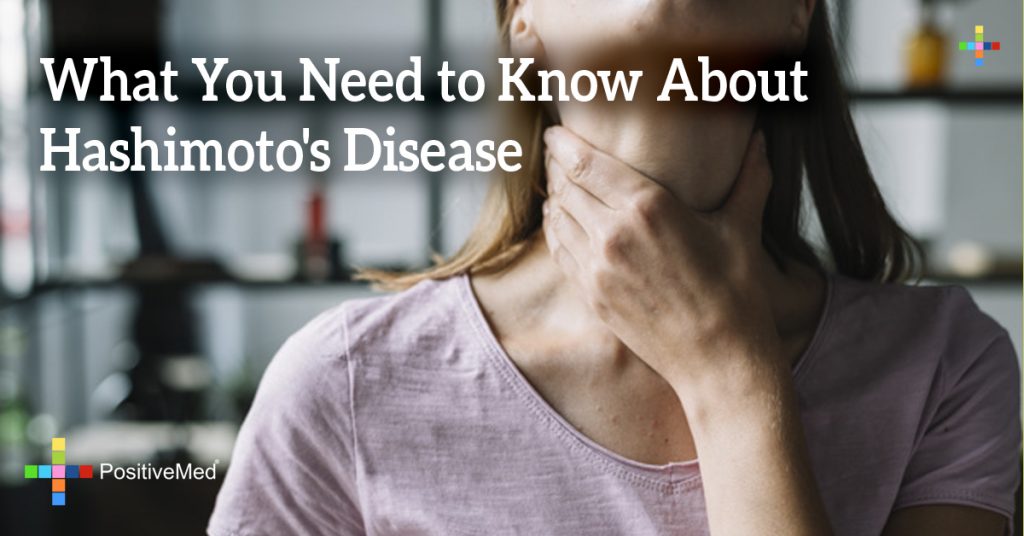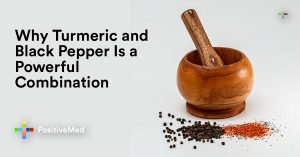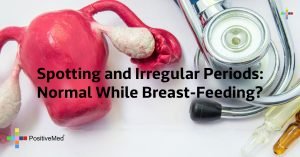
What You Need to Know About Hashimoto’s Disease
By PositiveMed-team
Edited By Stephanie Dawson
Hashimoto’s disease, or thyroiditis, is an autoimmune disease that affects the thyroid. The thyroid is a small gland at the front base of the neck, beneath the Adam’s apple and above the clavicle. The thyroid is responsible for hormones called T3 and T4 that regulate how the body utilizes energy from calories consumed. These hormones are regulated by the pituitary, which is a pea-sized gland in the brain that makes a thyroid-stimulating hormone called TSH. Hashimoto’s symptoms may be mild at first or take years to develop. The first sign of the disease is often an enlarged thyroid, called a goiter. The goiter may cause the front of the neck to appear swollen. An underactive thyroid causes every function of the body to slow down, such as heart rate, brain function, and metabolism. Hashimoto’s disease is closely related to Graves’ disease, another autoimmune disease that affects the thyroid.
With Hashimoto’s thyroiditis, the immune system makes antibodies that affect the thyroid gland and interferes with its ability to make hormones. These attacks cause the thyroid to become inflamed and under-active. A low-hormone producing thyroid is called hypothyroidism. Hashimoto’s disease is currently the number one cause of hypothyroidism in the United States and primarily affects “middle-aged” biological females, but it can affect anyone regardless of age or biological gender.
The causes for Hashimoto’s disease aren’t precisely known, but there are several risk factors to be aware of. People who have other autoimmune diseases such as vitiligo, rheumatoid arthritis, and lupus amongst others.Genes can play a large role, if there is someone in direct lineage who has an autoimmune disease, their descendant is at a high risk for the same illness or similar types of disease. Biological gender may also play a role, as it affects seven times as many biological females as biological males. Some people have thyroid problems within the first year after giving birth. As these symptoms, post-natal, tend to be temporary, around 20% of people who had them will later develop Hashimoto’s disease. Radiation exposure has been shown to trigger thyroid disease. This is true for those affected by the atomic bomb in Japan, the nuclear accident in Chernobyl, and radiation treatment of Hodgkin’s disease ( a type of cancer). Also, an excess of iodine, as well as some drugs, will also cause thyroid problems as iodine is required by the body to create thyroid hormones.

Symptoms of Hashimoto’s Thyroiditis:
Fatigue and sluggishness
Weight gain (which may be casual, but usually 20 pounds ((9kg)) or more)
Difficulty swallowing
Pale, dry skin
Puffy face
Constipation
Depression
Dry, thinning, brittle hair
Slowed heart rate
Feeling cold
Joint and muscle pain
Difficulty getting pregnant
Irregular or heavy menstruation
Irritability
Memory loss
Enlarged heart
Hoarseness
Treatment is usually uncomplicated, but due to the symptoms being quite similar to other autoimmune diseases, it’s important to see a doctor for a definitive diagnosis. Without treatment the disease will get worse and cause problems such as: infertility, miscarriage, giving birth to a child with birth defects, high cholesterol. Severe, underactive thyroid called myxedema can sometimes lead to seizures, heart failure, coma, and even death.
There is no cure, but Hashimoto’s disease typically responds very well to treatment, often only requiring a single tablet of levothyroxine a day. Levothyroxine is a synthetic version of the T4 thyroid hormone. It is called thyroid replacement therapy because it restores the T4 back to normal that the damaged thyroid can no longer make and only affects the metabolism. It almost always needs to be taken for the rest of a person’s life, in the same manner each day. However, like with most prescriptions, the dosage amount isn’t uniform. The doctor in charge of treatment will most likely order blood tests every 6 to 12 months to be sure thyroxine is at the appropriate level.
The University of Maryland Medical Center suggests eating whole grain foods high in fiber and vitamin B. As always, a diet of various fresh fruits and vegetables and antioxidant foods is beneficial. Fish oil may boost immunity and L-tyrosine supplements can help the body make more thyroid hormones. Herbs, such as coleus standardized extract and guggul standardized extract, taken 2 to 3 times a day, may help support low thyroid activity. Always check with the doctor before taking any supplement or herbal remedy.
SOURCES
Hashimoto’s Disease, Mayo Clinic – http://www.mayoclinic.com/health/hashimotos-disease/DS00567
Hashimoto’s Disease (thyroiditis) Facts, Women’s Health – http://www.womenshealth.gov/publications/our-publications/fact-sheet/hashimoto-disease.cfm#a





